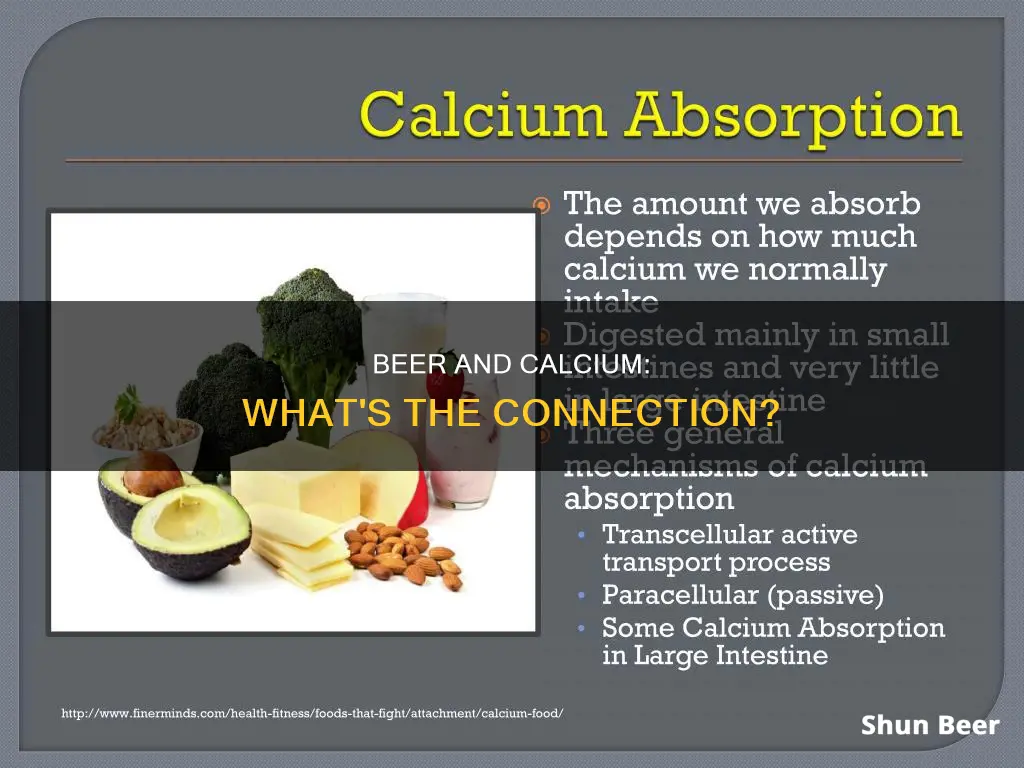
Beer is a rich source of silicon, which has been linked to increased bone density and strength. However, excessive alcohol consumption has been associated with bone loss. Research suggests that moderate alcohol intake – one drink per day for women and two drinks per day for men – may have beneficial effects on bone health.
| Characteristics | Values |
|---|---|
| Effect on bone density | Beer has been associated with increased bone density and strength, but excessive alcohol consumption has been linked to bone loss. |
| Effect on bone health | Beer may be better for bone health than other alcoholic drinks due to its high levels of the mineral silicon. |
| Effect on calcium | Excessive alcohol consumption can negatively impact calcium absorption in the intestine. |
| Calcium content | Commercial beers typically contain 35-40 mg/L of calcium. |
What You'll Learn

Beer contains calcium
Beer contains a small amount of calcium, which is an alkaline-earth metal. Calcium is naturally present in water and grain, and it is one of the most important components of brewing water. It has several important effects on the brewing process, including improving mash enzyme function, pH control, and protein coagulation. In addition, calcium can also reduce the sour flavour of magnesium.
The calcium content in beer comes from the raw ingredients, mainly the water and grist, as well as any salts added by the brewer. Commercial beers typically contain around 35 to 40 mg/L of calcium. However, this amount can vary depending on the type of beer and the brewing process. For example, a study of 52 types of bottled beer from different countries found that German and Armenian beers had the highest average calcium concentrations, while Portuguese beers had the lowest.
The presence of calcium in beer has been linked to potential health benefits, particularly for bone health. Dietary silicon, which is found in beer, is important for the growth and development of bone and connective tissues. Some studies have suggested that moderate drinkers have a lower risk of osteoporosis and hip fractures compared to non-drinkers, and that beer's dietary silicon may contribute to these bone-protecting effects. However, it is important to note that excessive alcohol consumption can have negative health effects, including an increased risk of falls and fractures. Therefore, moderate consumption is key when it comes to reaping the potential benefits of the calcium content in beer.
Beer and Basketball: Rupp Arena's Drinking Policy
You may want to see also

Excessive drinking can cause bone loss
Excessive drinking can disrupt vitamin and mineral absorption, including calcium and vitamin D, which are crucial for maintaining healthy bone development and density. Alcohol can hinder calcium absorption in the intestine and affect vitamin D metabolism, ultimately impacting the body's ability to build strong bones.
Additionally, chronic heavy drinking can cause hormone deficiencies in both men and women. In men, alcoholism may lead to reduced testosterone production, which is linked to the formation of osteoblasts, the cells that stimulate bone formation. In women, excessive alcohol consumption can decrease estrogen levels, which can negatively affect bone density as estrogen plays a role in inhibiting bone breakdown and may stimulate bone formation.
The negative impact of excessive drinking on bone health is further supported by research that found a positive relationship between alcohol consumption and osteoporosis. Compared to abstainers, individuals who consumed 2 drinks or more per day had 1.63 times the risk of developing osteoporosis.
Furthermore, heavy drinking can increase the risk of falls and fractures, which are more likely to occur in individuals with weak and thin bones. Therefore, excessive drinking can indirectly contribute to bone loss by increasing the likelihood of fractures.
While moderate alcohol intake, such as one drink per day for women and two drinks per day for men, may have positive effects on bone density, excessive drinking can disrupt nutrient absorption, hormone production, and increase the risk of falls, ultimately leading to bone loss.
Christians and Beer: Is Drinking Sinful?
You may want to see also

Beer is rich in silicon
Beer is a rich source of silicon, with commercial beers ranging from 6.4 to 56.5 mg/L in silicon content. Silicon is present in beer in the form of orthosilicic acid (OSA), which has a 50% bioavailability, making it a major contributor to silicon intake in the Western diet.
The high levels of silicon in beer are due to the presence of malted barley and hops, with hops containing up to four times more silicon than malt. However, since hops are used in smaller quantities than grain, most of the silicon in beer comes from the malted barley. The grist selection and brewing process also impact the level of silicon in beer, with products derived from barley tending to contain more silicon than those from a wheat-based grist.
The role of silicon in bone health has been well-studied, and it is considered a key ingredient for increasing bone mineral density. Moderate beer consumption may, therefore, help prevent osteoporosis, a disease characterized by low bone mass and deterioration of bone tissue.
However, it is important to note that while beer may be a good source of silicon, consuming more than one or two alcoholic beverages a day may have negative overall health effects. As such, it is recommended to consume beer in moderation to maintain good health.
Beer's Health Benefits: Friend or Foe?
You may want to see also

Alcohol affects vitamin and mineral absorption
Chronic heavy drinking also suppresses osteoblastic differentiation, affecting the bone-building process and repair of deficient bone, increasing the risk of bone fractures. Furthermore, alcohol can block yeast's access to magnesium, which is essential for yeast growth and, consequently, fermentation performance.
While some studies suggest that moderate alcohol consumption may have beneficial effects on bone health, the research is mixed, and heavy drinking is consistently linked to an increased risk of osteoporosis and bone loss. Therefore, it is important to consume alcohol in moderation and ensure a well-balanced diet rich in calcium and vitamin D to maintain healthy bone density.
The Magic of Auto-Fill Beer Cups: How Do They Work?
You may want to see also

Beer can be good for bone density
Beer has long been enjoyed as a refreshing and tasty beverage, but can it also offer benefits beyond its flavour? There is growing evidence that moderate beer consumption may positively impact bone health, particularly bone density. This article will explore the relationship between beer drinking and bone density, highlighting how beer can be good for your bones.
Beer and Bone Density
The relationship between alcohol consumption and bone health is complex and has been the subject of extensive research. While excessive alcohol intake is known to have detrimental effects on bone density, moderate consumption—typically defined as one drink per day for women and two drinks per day for men—may have beneficial effects.
A clinical study found that moderate beer consumption was associated with increased bone density and strength. This relationship is likely due to several factors, including the silicon content of beer. Silicon is a micronutrient that has been linked to the prevention of bone loss and the warding off of osteoporosis. The University of California reported that the silicon content of beer can range from 6.4 to 56.5 mg per litre, with pale ales having the highest levels.
It is important to note that not all beers are created equal when it comes to silicon content. Beers containing the highest levels of malted barley and hops, such as pale ales, provide the best sources of silicon. Non-alcoholic beers, light lagers, and wheat beers, on the other hand, tend to have lower amounts.
Mechanisms of Action
So, how does silicon in beer contribute to improved bone density? Silicon is a key component of connective tissues and is essential for the formation of collagen, which provides structure and strength to bones. Additionally, silicon may influence the regulation of bone-building cells, known as osteoblasts, and bone-resorbing cells, known as osteoclasts, thereby promoting bone growth and inhibiting bone loss.
Another mechanism by which beer may improve bone density relates to its calcium content. Calcium is a crucial mineral for bone health, and beer typically contains around 35 to 40 mg/L of calcium. This mineral plays a vital role in bone formation and maintenance, providing structure and strength to the skeletal system.
Considerations
While the potential benefits of beer on bone density are promising, it is important to consider a few key points. Firstly, excessive alcohol consumption, including beer, has been linked to bone loss and other health complications. Therefore, moderation is key when it comes to reaping the potential benefits of beer on bone density.
Secondly, individual differences should be taken into account. Factors such as age, gender, and overall health status can influence how alcohol affects bone density. For example, older individuals may experience different effects compared to younger adults. Additionally, men and women may respond differently due to variations in hormone levels, which interact with alcohol's impact on bone metabolism.
Lastly, beer should not be considered a cure or treatment for bone density issues. While it may provide some benefits, a well-rounded approach to bone health is essential. This includes a balanced diet rich in calcium and vitamin D, regular weight-bearing exercise, and maintaining a healthy lifestyle.
In conclusion, beer can indeed be good for bone density when consumed in moderation. The silicon and calcium content of beer contribute to improved bone strength and structure. However, excessive consumption can lead to negative consequences, including bone loss. Therefore, enjoying beer as part of a healthy lifestyle and consulting with a healthcare professional for personalised recommendations are essential for optimising bone health.
Beer Before Bed: Friend or Foe to Anxiety?
You may want to see also
Frequently asked questions
It is generally recommended that women have a maximum of one drink per day and men have a maximum of two drinks per day.
Moderate alcohol intake has been found to have a positive effect on bone density, while heavy drinking has been linked to lower bone density.
Beer is a rich source of silicon, which has been found to prevent bone loss and ward off osteoporosis. However, excessive alcohol consumption, including beer, has been linked to bone loss.
Alcohol can decrease the absorption of calcium in the intestine and impact vitamin D metabolism, which is crucial for bone density and building strong bones.
Excessive alcohol consumption has been linked to an increased risk of cardiovascular disease, certain types of cancers, and an increased risk of falls and fractures, especially for those with osteoporosis.







